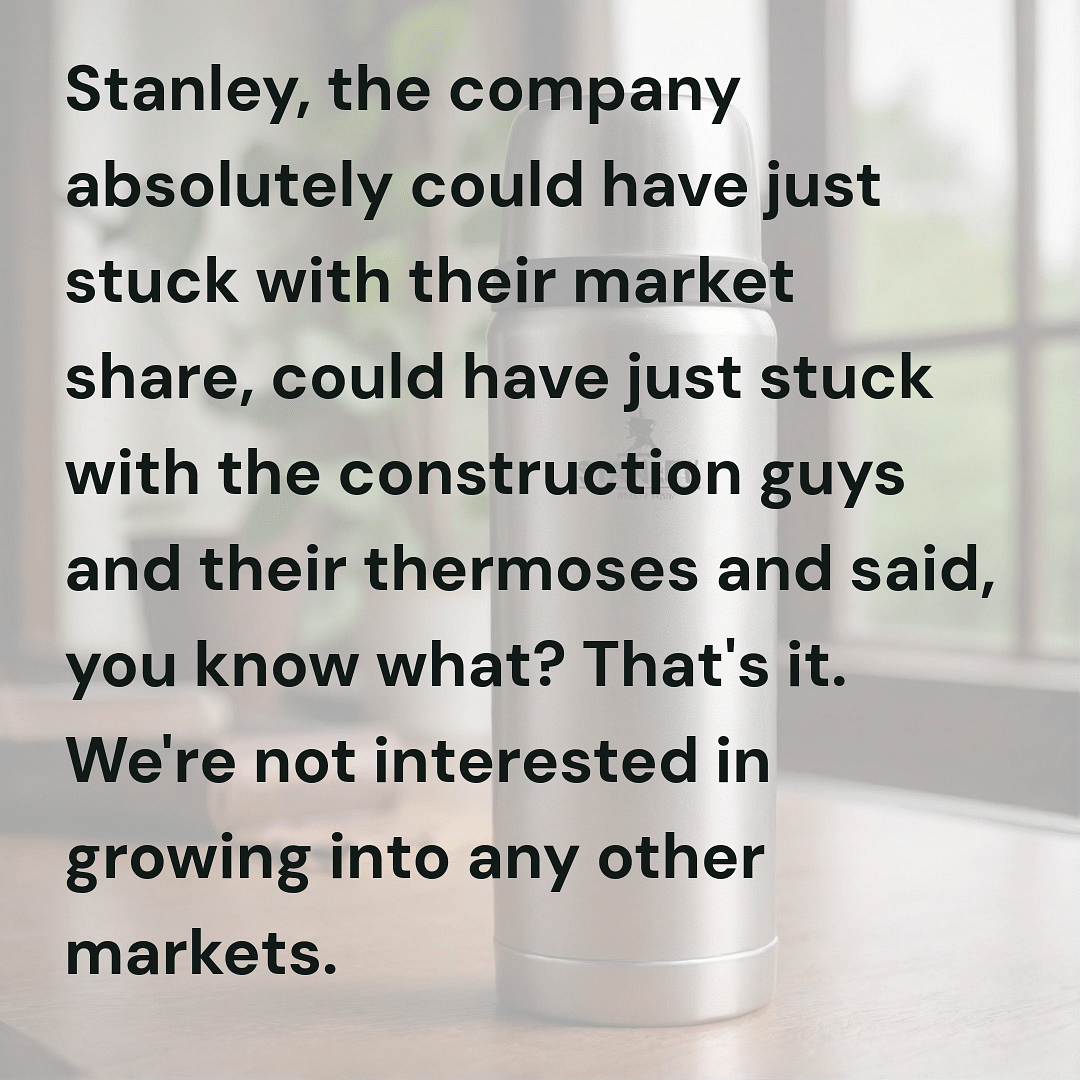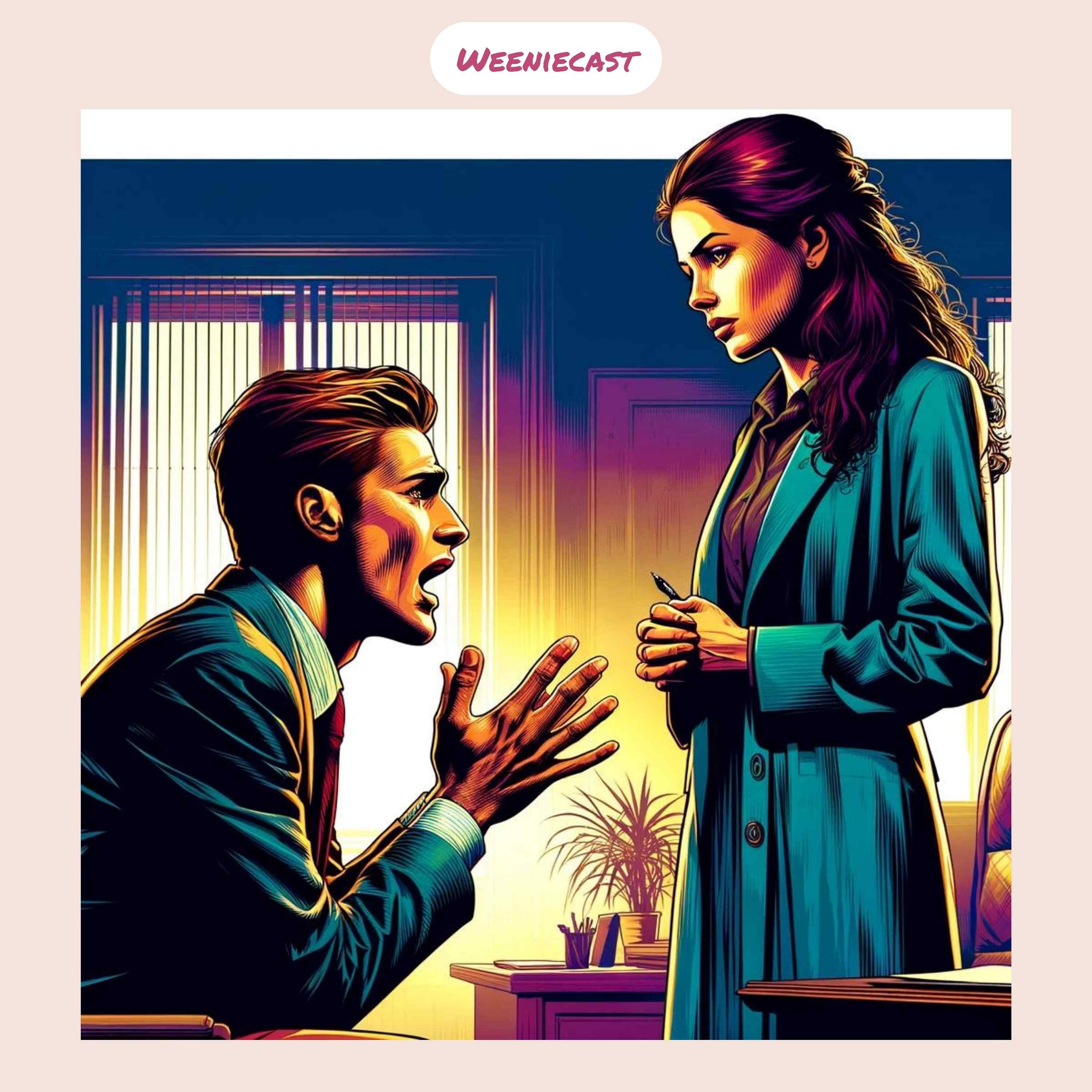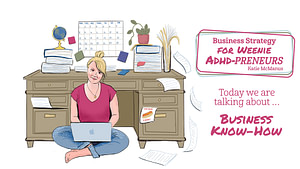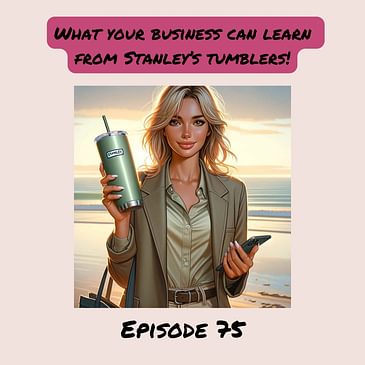Let’s talk tumblers. But not just any tumblers. Stanley tumblers. I want to spill the tea (but not literally, thanks to those tumblers!) on what your business can learn from the evolution, flexibility, and sheer brilliance of the Stanley tumblers story. Grab your favorite drink (in a Stanley, obvs hahaaha!), and let's get this party started! By the way, this episode and article is NOT sponsored by Stanley, sadly. I’d love it if it was. I just find the story fascinating and insightful. And it’s a great lesson for you, my wonderful community of ADHD entrepreneurs!
In case you prefer watching me talk about the business strategy we can all learn from stanely's tumblers.. video version's above!☝️
The Ever-Evolving Ideal Client: From Construction Sites to Pinterest Perfection
Once upon a time, Stanley's tumblers were the trusty sidekicks of construction workers, battling the elements and keeping drinks at just the right temperature. Fast forward a little, and boom – Pinterest moms are all over them, turning these rugged warriors into icons of style and functionality. When the soccer moms came a knocking, said, “hey, can you make more of these tumblers that you made once? We love them!”, Stanley listened, et voila! A new market opened for them. The lesson? Pay attention to the unexpected ways people are loving your products. Who knows, maybe your eco-friendly straws will be the next big thing in crafting circles!
Do you feel inspired about adapting to a new market?
Leave me a voice note with your thoughts and I'll share my feedback in a future episode.
Powered By Podcastpage.io
Adaptability is Key: The 'Soccer Mom Pivot'
So Stanley saw soccer moms eyeing their tumblers and thought, "Why not?"
They expanded their line, mixing in colors and features that made every soccer field and PTA meeting a bit more stylish.

It's like realizing your homemade spicy jam isn't just for toast – it's a cocktail mixer, a glaze for chicken, and a secret weapon in chili.
When your audience's needs change, swirl that creativity around and see where it takes you.
Outgrowing Your Niche: When It's Time to Swim in Bigger Ponds
Ever feel like you're the big fish in a small pond, ready to leap into the ocean?
That's a sign of growth, baby!
Maybe you started with helping startups manage their social media, but now, you're eyeing corporate clients dreaming of viral campaigns.

It's okay to evolve; your business suit might just turn into a wetsuit as you dive into working in deep water.
Or maybe you’ll get covered in Kevlar as you get involved with the military!
Niche Down to Rise Up: The Expertise Paradox
You don't need to be the jack-of-all-trades. Stanley mastered tumblers, and you can be the queen of, say, sustainable packaging for indie beauty brands.
Find that niche where you can be the go-to guru, and watch as your expertise becomes the lighthouse for clients navigating the murky waters of your industry.
For instance, I help people build businesses.
A partnership I absolutely could create is bringing in social media managers who can do that for my clients if my clients were asking for it.

Or choose your favorite app:
Embrace Change Like a Pro
Stanley's journey from work sites to fashionable outings is a masterclass in embracing change.
Your business might start with one idea, but who says you can't pivot to something even more fabulous?
That side hustle making quirky bookmarks? It could become a full-blown personalized gift empire.
Stay open, stay nimble, and dance with change – it's leading you to some exciting places.
And eventually, you may even find you outgrow your current clients!

Listening to the Market's Whispers (or Shouts)
Stanley listened when a new crowd wanted in on their tumblers, and your business should too.
Whether it's a sudden demand for your lavender-scented candles in yoga studios or your graphic design skills for ebook covers, tune in to those market signals.
They're like secret messages guiding you to your next big hit.
Your business journey, much like Stanley's adventure with tumblers, is about finding those intersections where your passion meets the world's needs.
It's about being fearless in the face of change, embracing the quirks of your audience, and always being ready to throw a little glitter on your offerings to make them shine.
So, my fabulous entrepreneur, what's your Stanley tumbler story?
Where will your curiosity and adaptability take you next? And as always, if you need help with figuring this out, feel free to book yourself in for a free generate income strategy call. The link’s below!
Your next steps after listening
Realizing it's time to work with me? Book your free intial strategy call with me - weeniecast.com/strategycall
Get more support in your ADHD entrepreneur life by joining my hyperfocus community! - https://weeniecast.com/hyperfocus
Wanna get this content earlier, and totally unbleeped? Subscribe to the Apple Podcasts premium version of this show - https://weeniecast.com/winners
Want to just buy me a coffee in return for some helpful insight? Thank you! Here's where you can do that - https://www.buymeacoffee.com/katiethecoach
Or you can fill in this form with any questions you have!
Speaker:
In this episode, I'm going to explain what
Speaker:
your business can learn from Stanley's Tumblers. Hi, I'm
Speaker:
Katie McManus, business strategist and money mindset coach. And welcome to the Weenie
Speaker:
cast. If you've ever
Speaker:
walked by a construction site, I guarantee you you've seen a certain kind
Speaker:
of thermos, and it's metal and it's green
Speaker:
and it's made by this company called Stan. And Stanley's been around
Speaker:
for forever. My dad was a carpenter, and I'm
Speaker:
sure we have them in my parents'house kicking around somewhere.
Speaker:
They were often sold in hardware stores and really
Speaker:
rough and tumble areas. I'm sure Home Depot has them. They
Speaker:
have a very long history of being like the working
Speaker:
man's thermos. They keep your coffee hot, they keep your water
Speaker:
cold, and I think you can also put poop in it because a liquid
Speaker:
is a liquid, right?
Speaker:
Stanley has gone through kind of a shift lately
Speaker:
because they created a tumblr
Speaker:
that went wild with the
Speaker:
Pinterest moms who want, like, a big thing of water with a
Speaker:
straw. They shifted their ideal client. Essentially, they made a ton
Speaker:
of money doing it. Stanley. The company used to make
Speaker:
$70,000 a year. And in the last four
Speaker:
years, after coming out with what they call the quencher,
Speaker:
the thermos that has the straw on the top, kind of like what you see
Speaker:
every soccer mom walking around with.
Speaker:
They grew their market share to
Speaker:
750,000,000 in four years.
Speaker:
In 2019, they brought in 73 million.
Speaker:
In 2021, they brought in
Speaker:
194,000,000. It's
Speaker:
insane. And why am I bringing this up? I'm not telling them.
Speaker:
I promise I don't get kickbacks. If you want to go buy one, buy
Speaker:
one. If you don't, don't worry, I'm not going to pressure you either way. But
Speaker:
I bring it up to make a point that your ideal client is going to
Speaker:
change. It's a natural progression for companies that are paying
Speaker:
attention to how their products are being used and how their
Speaker:
services are being sought out. Stanley, the company
Speaker:
absolutely could have just stuck with their market share, could have just stuck with the
Speaker:
construction guys and their thermoses and said, you know what?
Speaker:
That's it. We're not interested in growing into any other markets.
Speaker:
And yet they didn't. They
Speaker:
noticed when soccer moms. I say soccer moms,
Speaker:
lots of people got these, but it's kind of like the stereotypical Stanley
Speaker:
carrier now. They lobbed onto these tumblers and made it part of their
Speaker:
identity and it paid off. In your business, you're going to
Speaker:
have similar choices to make. What I had to do in my business, for
Speaker:
instance, I've talked about this many times. When I started my business, I started off
Speaker:
as a dating coach for men. Only one guy signed up. The
Speaker:
rest of my clients were women. And out of all of those clients, only one
Speaker:
of the women actually stuck with the dating topic. Everyone else needed to work on
Speaker:
how they were showing up at their job because they had really
Speaker:
boundary setting. They weren't great at asserting themselves. So we ended up
Speaker:
doing a lot of executive coaching and leadership training,
Speaker:
which led me down the road of becoming an
Speaker:
executive coach and a leadership development trainer in the
Speaker:
background. A lot of my coaching friends were like, wait a minute, how are you
Speaker:
getting clients? Because we're really struggling to get clients. And I realized
Speaker:
I had completely taken for granted my whole career in sales and marketing
Speaker:
and how I had kind of accidentally turned it into the system
Speaker:
that worked for me. And when I started showing it to them, it started working
Speaker:
for them and they started referring clients to me for this thing that I wasn't
Speaker:
even selling. And I realized I liked it so much better.
Speaker:
So I evolved my executive coaching and leadership training business
Speaker:
into a business building business because I felt like I was
Speaker:
teaching alchemy. Now after doing that for a couple of years, something
Speaker:
funny, I noticed that most of my clients had
Speaker:
ADHD and they were drawn to me. A because I'm
Speaker:
pretty open about having ADHD and B because I
Speaker:
work in a way that is really friendly to folks. With ADHD, there's
Speaker:
no hard and fast. Here's what you need to do and how you need to
Speaker:
do it and go, and you have to be my way the highway or get
Speaker:
the hell out. My strategist
Speaker:
are customizable to your personality, to
Speaker:
your work style, to the things that you like to do and spend your time
Speaker:
on, with a couple of exceptions, obviously. And that's how
Speaker:
the weaning cast was born. That's how I started
Speaker:
identifying as a business strategist and money mindset coach
Speaker:
for ADHD business owners.
Speaker:
There are a few signs that will pop up for you that will tell you
Speaker:
that your ideal client or your niche is ready to
Speaker:
change or evolve, and we're going to talk about that today. But we're
Speaker:
also going to talk about what is going to be required of you to
Speaker:
actually see it through to the other side because it's
Speaker:
scary to change who you work with. It's scary to get
Speaker:
more defined because you feel like, you're scaring people away.
Speaker:
And sure, sometimes you are. But like
Speaker:
Stanley, our dear friend, with the thermoses and the hot beverages and
Speaker:
the cold beverages, you can choose to stick with the status quo, and
Speaker:
hopefully it'll just stay the same. Or when opportunities
Speaker:
like the soccer moms come a knocking,
Speaker:
you can choose to run with them and hopefully
Speaker:
have a similar surge in business. And fingers
Speaker:
crossed that you jump from something like
Speaker:
73 million to 194,000,000 in two
Speaker:
years. If you do, please let me know. I would
Speaker:
like to invest in your business, but maybe tell me before you surge
Speaker:
so I can really get in with a good share price.
Speaker:
So here are a few of the signs that your ideal client or your
Speaker:
niche is wanting to change naturally.
Speaker:
The first one is your niche is narrowing down
Speaker:
naturally. Now, this is what happened for me. I started getting
Speaker:
a lot of clients who all had ADHD,
Speaker:
or they started working with me because they kind of suspected
Speaker:
that they did, and then they ended up getting diagnosed with it. During our time
Speaker:
together, if there was anyone out there who had a
Speaker:
theory that ADHD is contagious, they'd have a very easy
Speaker:
time coming up with bad evidence
Speaker:
by looking at some of my clientele, because it seems that when
Speaker:
people work with me, they get diagnosed with ADHD. It's not a causation
Speaker:
thing, it's more of a coincidence thing.
Speaker:
I don't cause ADHD in other people is what I'm saying. Okay. Don't come after
Speaker:
me now. I absolutely didn't have to go with the ADHD thing. I could
Speaker:
have just stayed a business strategist for heart centered service providers, which
Speaker:
I still talk a lot about. However, one of the things that
Speaker:
I saw is there were so many ADHD business owners who
Speaker:
are looking for support and not finding
Speaker:
neurodiversity friendly support. Like
Speaker:
myself. I had so many coaches in the beginning years
Speaker:
of my business that were neurotypical who
Speaker:
didn't understand that my brain just worked differently and caused
Speaker:
a lot of shame for me, really slowed me down because
Speaker:
they made how I was working in my own business wrong because it wasn't
Speaker:
their way. And when I started noticing this trend in
Speaker:
my business, that a lot of folks that were maybe ADHD
Speaker:
or definitely ADHD were coming to me, that there was this fear
Speaker:
they had that they were going to be made wrong. And I realized instead of
Speaker:
just having it kind of be an aside of, by the way, I have
Speaker:
ADHD, and you're safe with me to stick this flag
Speaker:
in the ground and say, no, this is an ADHD friendly space.
Speaker:
This is a space designed for people whose brains
Speaker:
work differently, whose brains have always had to
Speaker:
bend like pretzels to fit into the model
Speaker:
that has been handed to them. That's created by neurotypicals. We're not standing for
Speaker:
that anymore. We're creating. That works for you in your business.
Speaker:
Now, this could also happen. Like, for instance, when I said I was dating coach
Speaker:
for men and I got pretty much all female clients. That's
Speaker:
another instance of, like, your niche is kind of
Speaker:
naturally shifting to something else. I've said it before, and I
Speaker:
will say it a gazillion times. Again, picking a niche and
Speaker:
discovering your ideal client is a dance with the universe.
Speaker:
You're never going to find the right dance partner if you just sit on the
Speaker:
sidelines. You have to get up and you have to get on the dance floor,
Speaker:
and you have to dance with the first person. If they're the right
Speaker:
person to dance with, you're going to dance with them all night. Congratulations. There you
Speaker:
go. But if they're wrong, you're going to find your next partner,
Speaker:
and you're going to find your next partner, and then the next partner is going
Speaker:
to find you. It happens on the dance floor, it happens in
Speaker:
your business, but it can't happen if you don't get up and
Speaker:
start dancing. So that's one sign that your
Speaker:
niche or your ideal client is wanting to narrow down
Speaker:
further, is you're just naturally attracting a
Speaker:
subset within your niche.
Speaker:
The next sign is you're getting a lot of clients who are
Speaker:
signing up for the thing that you offer and then saying, hey, can
Speaker:
you also do this other thing? This
Speaker:
is the quintessential Stanley example. They
Speaker:
had a solid product that everyone knows
Speaker:
and loves. And once you have a Stanley Thermos and you're in the
Speaker:
Stanley Thermos family, like, once your friend drives over
Speaker:
your Stanley with their pickup truck and squashes it, you're just going to go and
Speaker:
replace your Stanley. But when the soccer moms came a knocking,
Speaker:
said, hey, can you make more of these tumblers that you made once? We love
Speaker:
them. It's a sign that you have a new market
Speaker:
available to you. You have a new service offer that
Speaker:
has a market that's ready to spend money on it. This is
Speaker:
a tricky one because you know how I talk about Candy a lot. I talked
Speaker:
about Candy a little bit in episode 66. It's also about how you can avoid
Speaker:
going to jail with your testimonials. Great episode. I recommend you go check it out.
Speaker:
But Candy Whiteis is basically where you have a bunch of clients who are all
Speaker:
asking you to add different random things onto your service
Speaker:
offering. Now, we want to be very careful around this,
Speaker:
because when you have candy, you get spread way too thin
Speaker:
doing way too many different things. And it's
Speaker:
incredibly hard to continue to deliver
Speaker:
at the level of excellence that you're used to when you're doing
Speaker:
so many different things. But if you find
Speaker:
that like 70% of your clients are saying, hey, can you also do
Speaker:
this one other thing? And it's all the same, that is a
Speaker:
beautiful sign from the universe saying, you need to start
Speaker:
expanding into this area. And if not expand, then maybe create
Speaker:
some partnerships so that you have other service providers who can come in and do
Speaker:
that thing. For instance, I help people build businesses. A
Speaker:
partnership I absolutely could create is bringing in social media
Speaker:
managers who can do that for my clients if my clients were asking for
Speaker:
it. The third sign that your ideal client is
Speaker:
changing is, what am I going to say next? Well, you'll have to keep
Speaker:
listening to find out. But first, squirrel, squirrel, squirrel,
Speaker:
squirrel.
Speaker:
The third sign that your ideal client is changing
Speaker:
is, quite frankly, you start out growing them.
Speaker:
I'll use kind of a fun example. So imagine through high school and
Speaker:
college, you became a swim instructor. You were working with kids,
Speaker:
and you really enjoyed showing five year olds
Speaker:
that they didn't necessarily have to drown if they got in the pool, that they
Speaker:
could go underwater and hold their breath and jump back up, and how they could
Speaker:
tread water and do the breaststroke and do the front stroke and do the
Speaker:
backstroke. You gave them this confidence, and it was something
Speaker:
that just lit you up. It was kind of a side job. But as you
Speaker:
progressed in your own swimming career, maybe you were given an opportunity to coach a
Speaker:
swim team, and maybe the swim team was middle schoolers or high
Speaker:
schoolers. And again, your swim career is
Speaker:
progressing. Perhaps there's an opportunity that
Speaker:
opens up the local college. They need someone to coach their swim
Speaker:
team. And eventually, you've completely
Speaker:
outgrown that initial first niche of teaching kids how to
Speaker:
swim. And you're now working with semiprofessional
Speaker:
swimmers on how they can improve their form so that they
Speaker:
can win races. That's a really natural progression of
Speaker:
outgrowing one niche and one ideal client and
Speaker:
growing into the next level. Now, part of this
Speaker:
is it happens naturally, because when you're just starting out,
Speaker:
you have more accessible memories of what it was like to be a beginner. This
Speaker:
is one of the reasons why a lot of the business building programs that are
Speaker:
available in digital form, digital courses, pdfs,
Speaker:
books that are written by people who have multimillion dollar
Speaker:
businesses. Why? They don't actually help people who are just starting out to
Speaker:
start their business. Because the person who created it is too far
Speaker:
along. They don't understand the beginning steps anymore. They're too far away from
Speaker:
it. They forgot a lot of bits. And of course, their
Speaker:
advice is still going to be helpful, but it's not necessarily right for
Speaker:
the person who's just starting out. Something that you want to pay attention
Speaker:
to is where do you feel drawn to work with people? Is it
Speaker:
changing over time? And are you losing touch with
Speaker:
where your clients are in the here and now?
Speaker:
If you're feeling drawn to move forward or if you're losing touch,
Speaker:
those are both signs that you're outgrowing your current client.
Speaker:
This is one of the areas of your business where being a weenie is
Speaker:
going to limit you. Because the only thing that will hold you back is
Speaker:
fear. The fear that if you narrow your niche further, that you're going to
Speaker:
scare too many people away and you're not going to be able to make money.
Speaker:
The fear that you're not qualified enough to do this
Speaker:
other thing, to expand into a new market, to offer a new
Speaker:
service. The fear that if you leave this
Speaker:
niche or this ideal client that you're outgrowing behind, you're never going to
Speaker:
get new business. And really, the thing
Speaker:
that is going to help you get over this
Speaker:
is by just stepping into the audacity to
Speaker:
be a leading expert. Now, when I talk
Speaker:
about having the audacity to be a leading expert, I'm
Speaker:
going to use one example that is kind of fraudy.
Speaker:
But I say this because I know you're
Speaker:
qualified. I know you're good at what you do. I know that you're an expert,
Speaker:
even if you don't see yourself as an expert. So I want you to
Speaker:
imagine like your typical Chad. And Chad just got back from
Speaker:
a three week trip in Italy. Chad is talking
Speaker:
like he is the ambassador to Italy. He's acting
Speaker:
like he knows everything. He's trying to tell you about the local
Speaker:
economy, about the language, about how people dress,
Speaker:
about the food. He's telling you about the wines. He's completely
Speaker:
mispronouncing them, but he's saying them very confidently.
Speaker:
Okay. Chad has no problem acting like
Speaker:
he's the leading italian expert in the whole fucking
Speaker:
world. You start talking about Michelangelo, and he's going to start
Speaker:
mansplaining you about the Mona Lisa. If you know anything about art that was not
Speaker:
made by Michelangelo. Chad has a lot of confidence. It's
Speaker:
misplaced, probably compensating for something,
Speaker:
but that's a conversation for another day. What we want to take from
Speaker:
Chad is the audacity he has
Speaker:
to see himself as a leading expert. Now, if
Speaker:
you don't necessarily want to channel your inner Chad, I want you to think about
Speaker:
a four year old wearing a batman shirt. Think about the confidence they walk
Speaker:
into the room with. They think they have.
Speaker:
You know, they may have just gotten Batman shoes that run really,
Speaker:
really fast, and they want you to watch. The thing about having
Speaker:
ADHD is we are constantly crippled by our imposter
Speaker:
syndrome, right? Because we're generalists. We jump
Speaker:
from hobby to hobby, interest to interest. We know a little about a
Speaker:
lot of things. But me, an expert, who am I to
Speaker:
say I'm an expert in anything? Ooh,
Speaker:
that's probably what you're thinking right now. And to you I say, you
Speaker:
got to suck it up, buttercup. You've been doing this for how
Speaker:
long now? One of the reasons we hold ourselves
Speaker:
back from declaring that we are a leading
Speaker:
expert in our respective fields is because we look
Speaker:
around and we see people who've done more than us. If you were to go
Speaker:
and look up in any dictionary the meaning of the word
Speaker:
expert, nowhere in there
Speaker:
does it say someone who has a PhD on a topic.
Speaker:
Nowhere in that definition is it going to say someone who has written at
Speaker:
least 20 books on a topic. It doesn't say that you have
Speaker:
to be the best in the field. It doesn't say that you have to have
Speaker:
your own tv show. It doesn't say that you have to have been interviewed by
Speaker:
Oprah. The definition of an expert is a person who has a
Speaker:
comprehensive and authoritative knowledge of a skill or
Speaker:
a particular area. By that definition, you are an
Speaker:
expert on numerous things. You might be an expert
Speaker:
cook. You might be an expert gardener. You might be an expert
Speaker:
coach. You might be an expert computer programmer.
Speaker:
You don't have to have a PhD or even a degree on
Speaker:
these things to be an expert. And I know it's intimidating
Speaker:
when you look around and you see all these people in these fields who have
Speaker:
all the bells and whistles. I'm a leading expert. But do you know where they
Speaker:
started? They started where you are right now. They had the fucking
Speaker:
audacity to say, you know what? I'm going to step into my
Speaker:
leading expert pants and I'm just going to own it. I'm going to lead
Speaker:
into it, and just start walking around in
Speaker:
them like you belong in them. No one's going to know the
Speaker:
difference. I mean, unless you're a fraud like Chad,
Speaker:
but, I mean, you're probably not. I
Speaker:
don't tend to draw on as many chads as some people might think.
Speaker:
The magical thing, when you embrace the
Speaker:
audacity to be the leading expert and you start really
Speaker:
engaging with your ideal clients in a way that you
Speaker:
can allow it to change, you can allow your niche to
Speaker:
evolve, you end up making a lot more money. Leading
Speaker:
experts, someone who is an expert in a very specific field,
Speaker:
make a lot more money than just generalists. Case in
Speaker:
point, neurosurgeons make a lot more money than just
Speaker:
general practitioner doctors. Very few people have a steady enough
Speaker:
hand to cut into a brain and have it go, well. Many,
Speaker:
many very talented general practitioner doctors
Speaker:
would unalive you if they tried that. Hey, they shake a little
Speaker:
bit. You also open the door to more markets. And I
Speaker:
don't just mean the Stanley example of this, where you're selling
Speaker:
to one market and then you get to add to another. I mean, you can
Speaker:
take over different tiers of the market as you grow
Speaker:
into your expertness. You can roll
Speaker:
out programs that help people who are just starting out. You can
Speaker:
work one on one with the top tier people in your
Speaker:
field. You can launch programs that help everyone. In between,
Speaker:
you have the ability and the authority to be the person that everyone
Speaker:
turns to in this area, and the best result
Speaker:
is that you become the de facto expert. You have to
Speaker:
work less hard to be known as the person people should go
Speaker:
to for help with this thing. I guarantee you there are tumblr
Speaker:
companies out there that are wondering, how are we going to convince
Speaker:
people that we're as good or better than the
Speaker:
Stanley Tumblr? It's a lot of work, but once they figure it
Speaker:
out, once they convince people, once they own that market
Speaker:
share, they're going to have no problem. They're going to be the de facto go
Speaker:
to Tumbler for people who really like their cold drinks cold and their
Speaker:
hot drinks hot. And whenever we talk about
Speaker:
expertiseness, being the leading expert in
Speaker:
something, we tend to think you have to know absolutely everything
Speaker:
in your field. You do not. You
Speaker:
absolutely do not. There are people who
Speaker:
work in the bra industry who might need to know a lot about all the
Speaker:
different kinds of bras and how you construct them and how you manufacture them
Speaker:
and how you market them and all that stuff, right? There are also
Speaker:
people who work strictly in the nipple cover
Speaker:
industry, okay? It's a very small area of the bra
Speaker:
boob industry. All they focus on is
Speaker:
creating little things that just cover your nipples so you can't see them through
Speaker:
your shirt. That's what they're the expert on. They don't have to be an expert
Speaker:
on the greater bra boob industry. They can just be an
Speaker:
expert in nipples. And here is your full permission
Speaker:
to be your own version of that nipple expert.
Speaker:
If you're ready to stop being a weenie and actually run a business that makes
Speaker:
money, then go ahead and book a generate income
Speaker:
strategy call with me by going to
Speaker:
weeniecast.com strategycall.
Speaker:
On this call, we will talk about your goals, your dreams,
Speaker:
and your frustrations in getting there. And if it's a fit
Speaker:
for both of us, then we can talk about different ways to work together.
Speaker:
There are people whose jobs are literally to create boob
Speaker:
tape. This is a job like, there are
Speaker:
engineers and inventors and
Speaker:
manufacturers that literally just make boob tape. And then
Speaker:
what is this? I haven't actually used these. I bought them
Speaker:
and I haven't used them yet. And then
Speaker:
we have. These are called Nippy's skin.
Speaker:
This is someone's job. This is a whole industry.
Speaker:
Whole companies are made around this.
Speaker:
Squirrel, squirrel, squirrel, squirrel.


